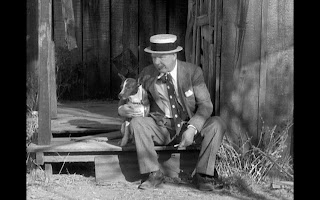
Director: Norman Z. McLeod
Release Country: United States
Times Previously Seen: none
The Story:
Harold Bissonette (pronounces "Bis-oh-nay"), a mumbling, bumbling goofball of a man inherits some cash and seemingly wastes it by buying his lifelong dream: an orange orchard. Much to his wife's dismay, he sells their grocery store in New Jersey, packs up the family and heads to California. Upon arrival, they discover that the hoped-for splendor of an orchard is a complete dust bowl. Just when it all seems to be lost, Bissonette is offered a true orchard and tons of cash for the property, so that some prospectors can build a grandstand for a race track. All's well that ends well.
Take 1: My Gut Reaction (done after one viewing & before any research):
I enjoyed the movie for giving me a few really good laughs, but overall I don't love it.
I love W.C. Fields for probably the same reason that everybody has loved and still does love him - he's a character. He never had the wit of Groucho Marx, the pure physical abilities of Charlie Chaplin or Buster Keaton, and he was never in movies that told interesting tales. Still, there was no one at all like him: a half-clueless, drunken clown who spent half of his movies insulting those around him under his breath, while refusing to notice his own total ineptitude.
It's a Gift is pretty forgettable, story-wise. As with the other Fields films I've seen, the plot serves purely as a vehicle for Fields to do his thing - getting verbally and physically abused for his buffoonery and staring back at the world from between those narrow slits of eyes as if to say, "All of you are mad. Leave me out of all this."
When I try to pin down what it is that makes Fields so damn funny, I think of the reason my Dad gave me years ago: it's the under-the-breath comments. Dad's right. It's that and, like Buster Keaton, the downright refusal to so much as crack a smile.
When I try to pin down what it is that makes Fields so damn funny, I think of the reason my Dad gave me years ago: it's the under-the-breath comments. Dad's right. It's that and, like Buster Keaton, the downright refusal to so much as crack a smile.
One of the earliest scenes of Field's goofy interactions with his family. A still photo does him small justice - you've got to see him in action to witness his genius physical comedy.
The way he gets continually badgered by the people and world around him is all just the foil for his responses. In truth, a lot of the scenarios do become quite tiresome and annoying. In a handful of them, there's a good payoff, with Fields delivering a really snarky line. Other times, they fall flat.
Basically, Fields was something like the Will Farrell of his day. Not that they play the same character - but both men continually play singular characters of their own design. Farrell is always a semi-clueless, hyperactive gorilla; Fields was always a semi-clueless, lazy tippler. Neither man made a career of being in thoughtfully plotted films, but I laugh at them, all the same. Maybe not at all of their jokes, but enough to keep me coming back.
Take 2; or, Why Film Geeks Love This Movie (done after some research):
There's not much research to be done on this one. TIME Magazine didn't even do an original review for it back in 1934. The one thing that critics of past and present point to is what strikes everyone about W.C. Fields films, and that's W.C. Fields. It's funny to notice that no analysis of the film gives more than a line or two about the story, or anything else, aside from Fields. This is as it should be. All reviewers point to Fields' singularly misanthropic, yet lovable and engaging, character. It's a Gift, by most accounts, had the greatest number of solid gags in it. It's put quite well in the one paragraph here on the TIME website.
The other things worth mentioning are (surprise, surprise) about Fields himself. Born William Claude Dukenfield (quite a handle, that), the young Fields would become a world-class juggler and vaudevillian. By all accounts, he never drank as a young man, so that he could maintain the dexterity needed for his craft. However, the other performers drank like fish. Fields enjoyed their company, so had booze on hand for them. Eventually, he took to the sauce as well. Like it was his job. It's interesting to me that a highly social, phenomenally agile performer would make his name playing a hilarious, person-hating sot. Oh, the irony.
A scene from the end, just before Fields delivers one of his most famous (and often ripped-off) lines:
Bosterly: You're drunk!
Bissonette (Fields): And you're crazy. But I'll be sober tomorrow and you'll be crazy the rest of your life.
Bosterly: You're drunk!
Bissonette (Fields): And you're crazy. But I'll be sober tomorrow and you'll be crazy the rest of your life.
That's a wrap. 10 shows down. 95 to go.
Coming Soon: The Bride of Frankenstein (1935):
Please pick up all empties on the way towards the exits.

No comments:
Post a Comment